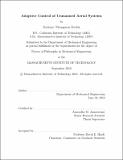Adaptive control of Unmanned Aerial Systems
Author(s)
Dydek, Zachary Thompson
DownloadFull printable version (8.374Mb)
Alternative title
Adaptive control of UAS
Other Contributors
Massachusetts Institute of Technology. Dept. of Mechanical Engineering.
Advisor
Anuradha M. Annaswamy.
Terms of use
Metadata
Show full item recordAbstract
Adaptive control is considered to be one of the key enabling technologies for future high-performance, safety-critical systems such as air-breathing hypersonic vehicles. Adaptive flight control systems offer improved performance and increased robustness to uncertainties by virtue of their ability to adjust control parameters as a function of online measurements. Extensive research in the field of adaptive control theory has enabled the design, analysis, and synthesis of stable adaptive systems. We are now entering the stage in which adaptive flight control systems have reached the requisite level of maturity for application to hardware flight platforms. Unmanned aerial systems (UAS) provide a unique opportunity for the transition of adaptive controllers from theory to practice. The small, unmanned aerial vehicles (UAVs) examined in this thesis offer a low-cost, low-risk stepping stone between simulation and application to higher-risk systems in which safety is a critical concern. Unmanned aircraft also offer several benefits over their manned counterparts including extreme persistence, maneuverability, lower weight and smaller size. Furthermore, several missions such as surveillance, exploration, search-and-track, and lifting of heavy loads are best accomplished by a UAS consisting of multiple UAVs. This thesis addresses some of the challenges involved with the application of adaptive flight control systems to UAS. Novel adaptive control architectures are developed to overcome performance limitations of UAS, the most significant of which is a large time delay due to communication and limited onboard processing. Analytical tools that allow the calculation of a theoretically justified time delay limit are also developed. These tools in turn lead to an estimate of the time-delay margin of the closed-loop system which is an essential part of the validation and verification methodology for intelligent flight control systems. These approaches are validated numerically using a series of simulation studies. These controllers and analytical methods are then applied to the UAV, demonstrating improved performance and increased robustness to time delays. Also introduced in this thesis is a novel adaptive methodology for coordinated adaptive control of a multi-vehicle UAS. Including two distinct classes of adaptive algorithms at both the local and global levels was found to result, both in simulation and in actual flight 3 tests, in decreased tracking error for individual vehicles, decreased errors in intervehicle distances, and reduced likelihood of collisions with other vehicles or obstacles in the environment.
Description
Thesis (Ph. D.)--Massachusetts Institute of Technology, Dept. of Mechanical Engineering, 2010. This electronic version was submitted by the student author. The certified thesis is available in the Institute Archives and Special Collections. Cataloged from PDF version of thesis. Includes bibliographical references (p. 133-139).
Date issued
2010Department
Massachusetts Institute of Technology. Department of Mechanical EngineeringPublisher
Massachusetts Institute of Technology
Keywords
Mechanical Engineering.